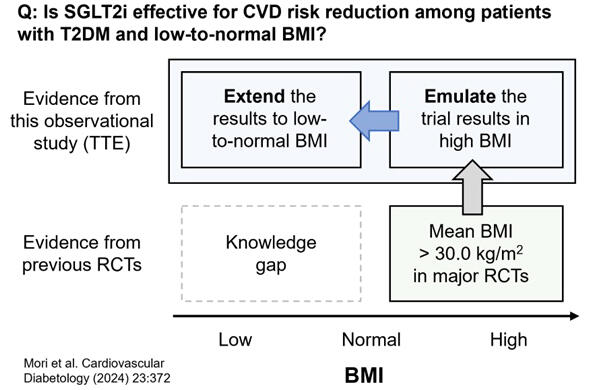A research group comprising Doctoral Student Yuichiro Mori (physician), Associate Professor Kosuke Inoue, Professor Naoki Kondo, Professor Shingo Fukuma, and Professor Motoko Yanagita of the Graduate School of Medicine at Kyoto University, Toshiaki Komura of Boston University, Ryuichiro Yagi and Motohiko Adomi of Harvard University, and researchers of the University of California, Los Angeles and the University of Washington analyzed the data (for approximately 5.6 million individuals) from records of preventive health screening for lifestyle-related diseases and insurance claims of the Japan Health Insurance Association and found that SGLT2 inhibitors for the treatment of diabetes mellitus were less effective against cardiovascular disease in thinner patients with diabetes mellitus. The study was published in Cardiovascular Diabetology.

Provided by Kyoto University
SGLT2 inhibitors for treating diabetes mellitus have been evaluated as being outstandingly effective among existing antidiabetic agents because they promote urinary excretion of excess blood glucose and have been demonstrated to be highly effective in preventing cardiovascular disease in various clinical trials. Meanwhile, in clinical practice, "considering their mechanism of action, the question about their effectiveness in thinner patients with diabetes mellitus, which are common among Japanese patients, served as the impetus for this study" (Mori).
Although large-scale clinical trials of SGLT2 inhibitors for the treatment of diabetes mellitus in the United States and Europe have been conducted on a scale of 10,000-20,000 patients, their mean body mass index (BMI) exceeded 30. As data on patients with an average weight (BMI = 25) and lower weight (BMI ≤ 20) were not adequate, the effectiveness in thinner patients with diabetes mellitus was not fully examined.
In this study, the research group used the Japan Health Insurance Association database to conduct research by reproducing real clinical trials as accurately as possible on the database. The patients were divided into two groups: a group of patients using SGLT2 inhibitors and a control group of DPP4 inhibitor users, which account for about 60% of patients in Japan. After the study population was clearly defined to mimic the clinical trials, a target trial emulation was performed with the strictly defined timing of eligibility assessment, treatment allocation (matching), and follow-up initiation. Of approximately 280,000 patients included, 85,000 were non-obese patients with diabetes mellitus (BMI ≤ 25).
During a mean follow-up period of 27.5 months, 8,000 patients (about 3%) developed cardiovascular disease (myocardial infarction, stroke, heart failure, or death), and the effectiveness of SGLT2 inhibitors in improving cardiovascular outcomes differed depending on BMI. Specifically, cardiovascular events decreased by approximately 8% in the group of patients with a BMI of ≥25, whereas the effect was not demonstrated in the group of patients with a lower BMI. The results suggest that SGLT2 inhibitors may be less effective in improving cardiovascular outcomes in diabetic patients with a lower BMI compared to those with a higher BMI.
Mori said, "Our biggest concern is that some patients might take the message too far and stop SGLT2 based on these results alone. DPP4 inhibitors in the control group are considered to be not very effective, but our data indicate that SGLT2 inhibitors may only be as effective as the DPP4 inhibitors. We need to look at the data more closely for every patient and conduct additional studies to determine who seems to be responding well and who does not."
Journal Information
Publication: Cardiovascular Diabetology
Title: Sodium-glucose cotransporter 2 inhibitors and cardiovascular events among patients with type 2 diabetes and low-to-normal body mass index: a nationwide cohort study
DOI: 10.1186/s12933-024-02478-7
This article has been translated by JST with permission from The Science News Ltd. (https://sci-news.co.jp/). Unauthorized reproduction of the article and photographs is prohibited.




